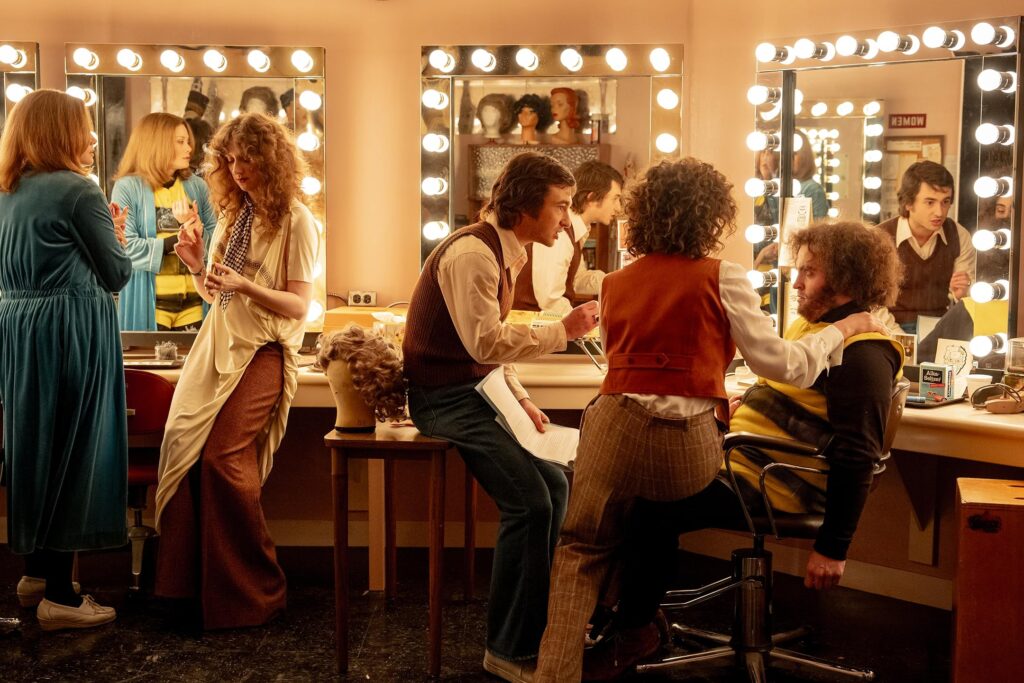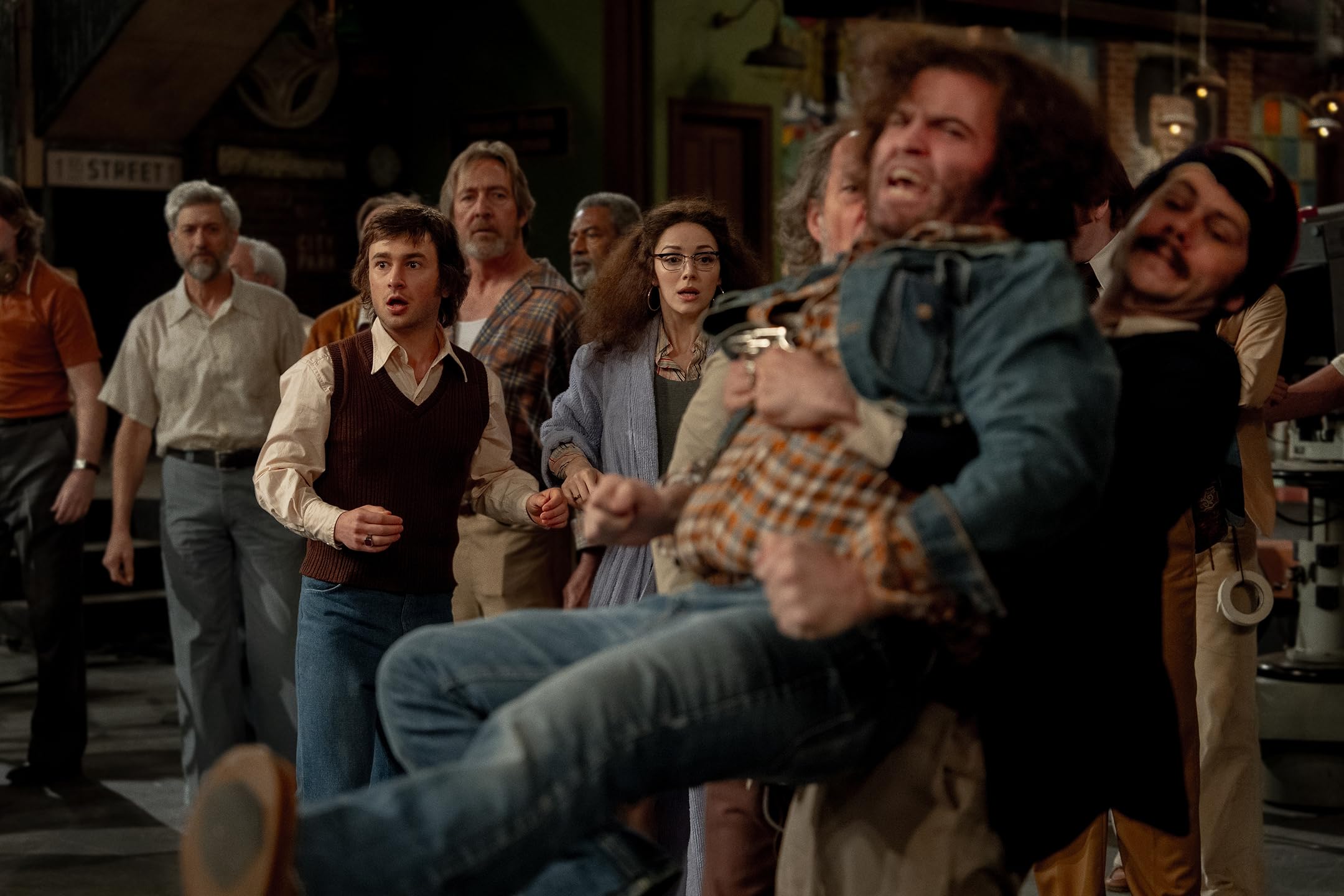There are few more recognisable brands in the world of entertainment than Saturday Night Live. Originally known as simply Saturday Night, the comedy variety show (which I’ll refer to as SNL going forward in this review) has been a stalwart of the American television landscape. In the almost half-century since SNL debuted, producer Lorne Michaels has provided a platform for a pantheon of beloved comedians including Bill Murray, Eddie Murphy, Will Ferrell, Tina Fey and Kristen Wiig to name but a few. The success of SNL has also spawned a slew of hit comedy films including The Blues Brothers and Wayne’s World.
Ahead of the fiftieth anniversary of SNL, director Jason Reitman and Sony Classics have produced the film Saturday Night. Reitman will be best known to audiences for directing the Oscar-nominated film Juno. He is also responsible for the two most recent entries in the Ghostbusters franchise. With Saturday Night, Jason Reitman provides viewers with an account of the events that occurred during the evening of the broadcast of the inaugural episode of SNL.
Saturday Night was released in the United States back in October to coincide with the start of SNL’s fiftieth season. It has now just made its way across the Atlantic to the United Kingdom and Ireland, where it is currently showing in cinemas. So does Saturday Night deliver a fitting tribute to one of comedy’s most enduring brands?

The events of Saturday Night take place on the evening of October 11, 1975. The film focuses primarily on novice TV producer Lorne Michaels (Gabriel LeBelle), and NBC TV executive Dick Ebersol (Cooper Hoffman). The duo, along with Lorne’s wife Rosie Shuster (Rachel Sennott) are attempting to rehearse the first episode of Saturday Night.
A variety of technical issues including faulty lighting equipment and sound issues plague these rehearsals. Lorne also has the unenviable task of managing the larger-than-life personalities of Saturday Night’s cast. These difficult cast members include a drug-addled John Belushi (Matt Woods), and the egotistical Chevy Chase (Corey Michael Smith). During Saturday Night, Belushi and Chase frequently butt heads with the arrogant Chevy Chase regularly taunting Belushi.
On top of having to manage their cast members, Lorne has to contend with sceptical NBC executives. Dick Ebersol informs Lorne that NBC programming executive Dick Tebet is willing for Saturday Night to be a failure. He also tells Lorne that Tebet only commissioned the show as part of a contract dispute between NBC and late-night chat show host Johnny Carson. This dispute revolves around NBC wanting Johnny Carson to fulfil a contractual obligation to produce episodes of The Tonight Show to air at weekends.
Saturday Night features a stellar cast portraying the various comedians featured in the inaugural episode of SNL. The film’s large cast of secondary characters includes Dylan O’Brien as Dan Akroyd, Emily Fairn as Laraine Newman, and Lamorne Morris as playwright Garrett Morris. Succession Actor Nicholas Braun bizarrely portrays both comedian Andy Kaufmann and Muppets creator Jim Henson.
The other two standout performances in Saturday Night come from Corey Michael Smith and Matt Woods. Corey Michael Smith is the spitting image of Chevy Chase. He also carries himself with an arrogance and air of superiority that makes you instantly dislike his character. Matt Woods meanwhile perfectly captures the electric and madcap energy of John Belushi. It’s hard to take your eyes off the screen when Woods’ John Belushi is onscreen. This is particularly the case when he has to share a scene with Chevy, as you can feel the animosity between them.
The biggest issue with Saturday Night is that despite its compelling cast of characters, it’s simply not very entertaining. The film unfolds in real-time over the 90 minutes leading up to the premiere of SNL’s first episode. Several other films, such as the 2022 movie Boiling Point, have employed this technique to create tension in their narratives. While this technique can be effective in generating tension, it fails miserably in this case. This is primarily because viewers know that Saturday Night was a success. This is because the show continues to air to this day almost 50 years later.
Despite my earlier praise for its cast, the other significant issue with Saturday Night is its poor use of cast. Screenwriter Jason Reitman and Gil Kenan’s script fails to flesh out its colourful cast of characters beyond “This person is important because they were an original SNL cast member”.
Saturday’s Night also lets us spend so little screen time with its secondary characters that it is nigh on impossible to emotionally invest in them. This is particularly true in its depiction of the female characters in Saturday Night. A perfect example of this is the movie’s treatment of Rosie Shuster (Rachel Sennott). Despite being a co-founder of the show, and one of its writers, Rosie’s role in the film is largely reduced to down whether or not she uses her maiden name in the show’s closing credits. Ella Hunt and Kim Matula also get minimal screen time to work with as Gilda Radner and Jane Curtin respectively.
Saturday Night is director Jason Reitman’s latest failed attempt to evoke nostalgia for a beloved media property. Like his two recent Ghostbusters movies, Saturday Night is a film that relies too heavily on audience nostalgia and reverence for the Saturday Night Live brand to create a sense of importance to what is occurring on screen. Moreover, the film fails to provide viewers with the necessary time and space to emotionally connect with its diverse cast of culturally significant characters. Consequently, younger audiences will struggle to emotionally invest in the movie. This applies to international audiences as well who are less invested in SNL’s rich history.
Saturday Night is currently showing in cinemas in the United Kingdom/Ireland. It is available to stream on Netflix in the United States
